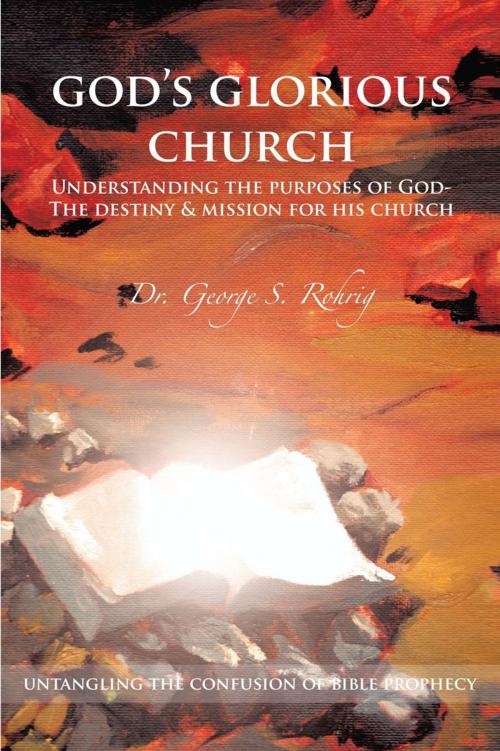God's Glorious Church
Understanding the Purposes of God
Nonfiction, Religion & Spirituality, Inspiration & Meditation, Inspirational, Spirituality| Author: | Dr. George S. Rohrig | ISBN: | 9781456716790 |
| Publisher: | AuthorHouse | Publication: | April 8, 2011 |
| Imprint: | AuthorHouse | Language: | English |
| Author: | Dr. George S. Rohrig |
| ISBN: | 9781456716790 |
| Publisher: | AuthorHouse |
| Publication: | April 8, 2011 |
| Imprint: | AuthorHouse |
| Language: | English |
This book is a must read for every serious student of the Bible. The question of Israel and the Church in relation to Gods eternal purpose is one of the most important subjects defining the Mission of the Church and the many confusing and often misleading interpretations of Bible prophecy. A correct understanding of the roles played by each in the economy of God is vital to the furtherance of the mission and destiny of the Church in this present time as well as the eschatological implications involved.
It is the authors intention to present his positions based on scripture rather than extensive reliance on other writer's positions requiring extensive foot notes. He has purposely included the text of many supporting scriptures in the context of the book to allow the reader to view them without turning to a footnote or index in the back of the book or turning to your Bible in order to read them. You are encouraged to read the supporting Bible verses in order to evaluate the veracity of the positions presented.
Considerable emphasis is given to the contrasts between the Dispensational Futurist doctrine held by many evangelicals today and the more historic teachings of the reformers of the 15th and 16th century and many evangelicals in the church today. The author examines the presuppositions fundamental to dispensational futurism as presented by Charles Darby, Dr Schofield, Dr. Pentecost, J.B. Blackstone, Dr. Ryrie and others which hold to a total separation between Israel and the Church, contending that the church has no part in fulfilling any of the Old Testament promises made to Israel.
The author presents irrefutable evidence as to the fallacious nature of these presuppositions upon which dispensational futurism stands by examining many Old Testament prophecies and promises fulfilled in the church, including the promised new covenant which Jesus, the testator, instituted at his death. The death of Christ is revealed as the ultimate and final sacrifice whereby God concluded His relationship with Israel under the Mosaic Covenant and began His relationship with a new holy nation encompassing both Jew and gentiles of faith. He broke down the middle wall of partition between the Jew and the gentile making them one Holy Nation, the church. The church is seen as heir to the promises made to Abraham and to Christ.
The question of the Kingdom of God in the present age as apposed to a future millennial age is discussed at length because of its importance to the mission and destiny of the church in the eternal purposes of God and the role of individual believers in fulfilling their calling and purpose in possessing the kingdom of God.
This book represents a logical and biblically based understanding of the Kingdom of God and the events surrounding the second coming of Jesus Christ. By defining from scripture the roles played by Israel and the Church in Bible prophecy, it brings into focus a clear understanding of the mission and destiny of the Church and each individuals role in fulfilling that mission.
By untangling the confusion surrounding the subject of Bible prophecy and Gods purpose and destiny for His glorious Church, which He purposed in Christ, it unleashes the reader to come to a Biblical understanding of the following questions:
-
What constitutes the people of God in the earth today?
-
How do the prophecies of the Old Testament relate to the church today?
-
What is The Kingdom of God, when and where does it exist?
-
What does the Bible teach concerning the rapture of the Church seven years before the second coming of Christ?
-
Does the Bible teach two separate and distinct plans of redemptionone for Jews and another for the Gentiles?
-
What is the ultimate purpose and mission of Gods Glorious Church?
-
How does this affect your mission and destiny in the Kingdom of God?
This book is a must read for every serious student of the Bible. The question of Israel and the Church in relation to Gods eternal purpose is one of the most important subjects defining the Mission of the Church and the many confusing and often misleading interpretations of Bible prophecy. A correct understanding of the roles played by each in the economy of God is vital to the furtherance of the mission and destiny of the Church in this present time as well as the eschatological implications involved.
It is the authors intention to present his positions based on scripture rather than extensive reliance on other writer's positions requiring extensive foot notes. He has purposely included the text of many supporting scriptures in the context of the book to allow the reader to view them without turning to a footnote or index in the back of the book or turning to your Bible in order to read them. You are encouraged to read the supporting Bible verses in order to evaluate the veracity of the positions presented.
Considerable emphasis is given to the contrasts between the Dispensational Futurist doctrine held by many evangelicals today and the more historic teachings of the reformers of the 15th and 16th century and many evangelicals in the church today. The author examines the presuppositions fundamental to dispensational futurism as presented by Charles Darby, Dr Schofield, Dr. Pentecost, J.B. Blackstone, Dr. Ryrie and others which hold to a total separation between Israel and the Church, contending that the church has no part in fulfilling any of the Old Testament promises made to Israel.
The author presents irrefutable evidence as to the fallacious nature of these presuppositions upon which dispensational futurism stands by examining many Old Testament prophecies and promises fulfilled in the church, including the promised new covenant which Jesus, the testator, instituted at his death. The death of Christ is revealed as the ultimate and final sacrifice whereby God concluded His relationship with Israel under the Mosaic Covenant and began His relationship with a new holy nation encompassing both Jew and gentiles of faith. He broke down the middle wall of partition between the Jew and the gentile making them one Holy Nation, the church. The church is seen as heir to the promises made to Abraham and to Christ.
The question of the Kingdom of God in the present age as apposed to a future millennial age is discussed at length because of its importance to the mission and destiny of the church in the eternal purposes of God and the role of individual believers in fulfilling their calling and purpose in possessing the kingdom of God.
This book represents a logical and biblically based understanding of the Kingdom of God and the events surrounding the second coming of Jesus Christ. By defining from scripture the roles played by Israel and the Church in Bible prophecy, it brings into focus a clear understanding of the mission and destiny of the Church and each individuals role in fulfilling that mission.
By untangling the confusion surrounding the subject of Bible prophecy and Gods purpose and destiny for His glorious Church, which He purposed in Christ, it unleashes the reader to come to a Biblical understanding of the following questions:
-
What constitutes the people of God in the earth today?
-
How do the prophecies of the Old Testament relate to the church today?
-
What is The Kingdom of God, when and where does it exist?
-
What does the Bible teach concerning the rapture of the Church seven years before the second coming of Christ?
-
Does the Bible teach two separate and distinct plans of redemptionone for Jews and another for the Gentiles?
-
What is the ultimate purpose and mission of Gods Glorious Church?
-
How does this affect your mission and destiny in the Kingdom of God?















